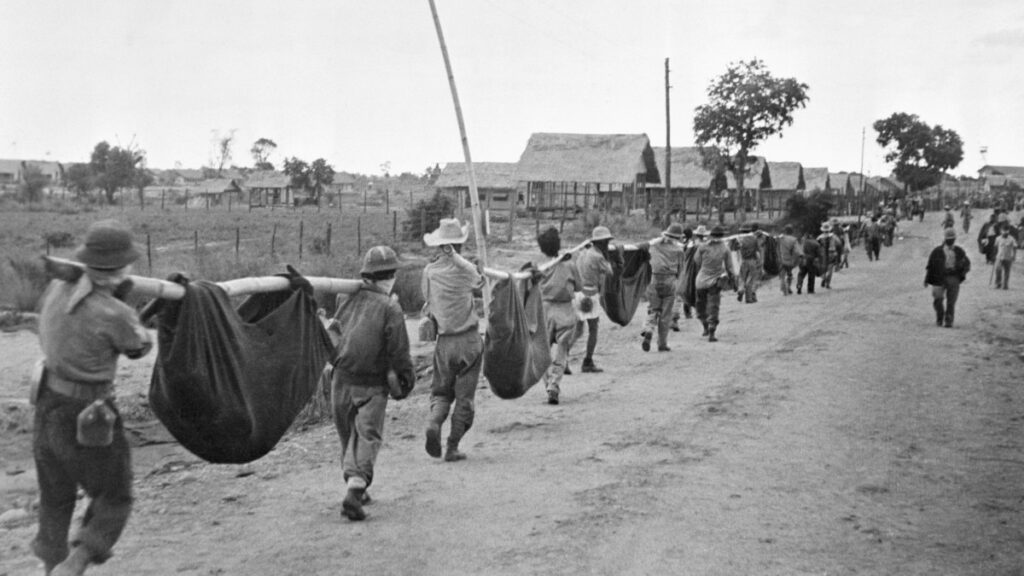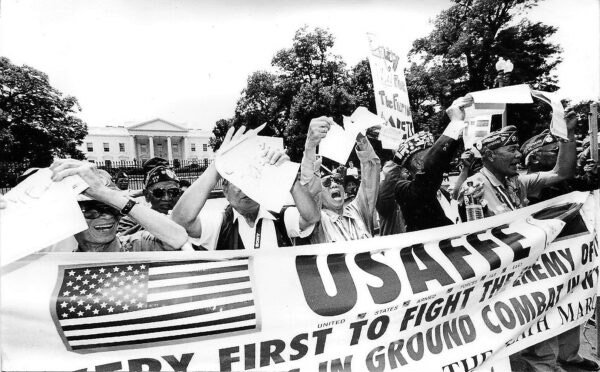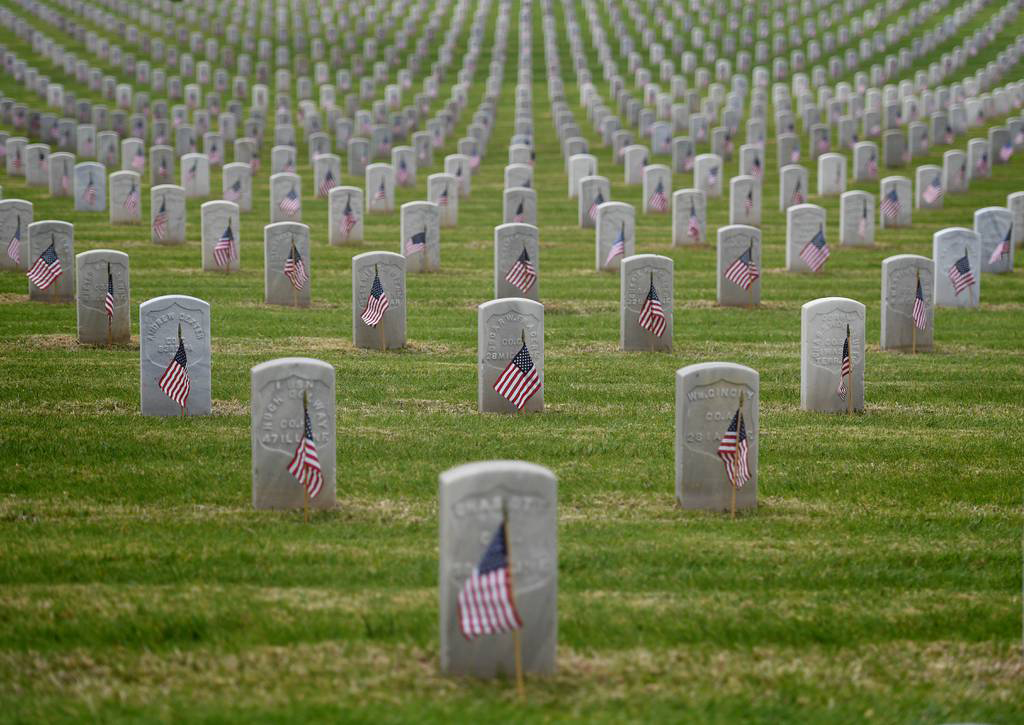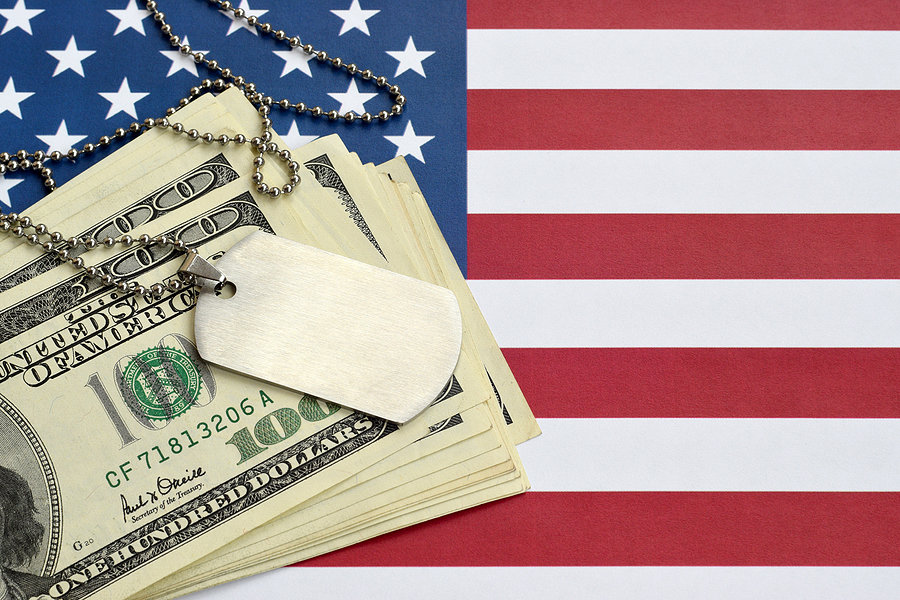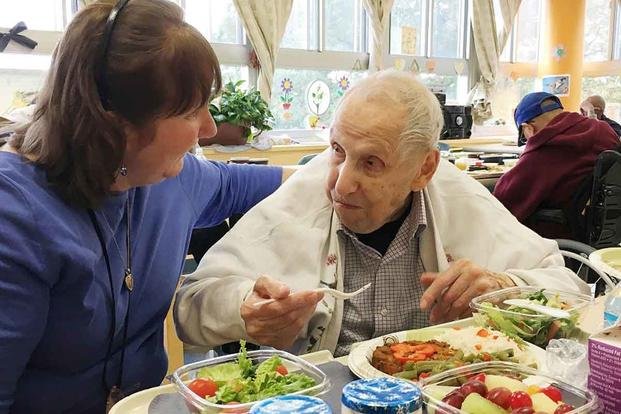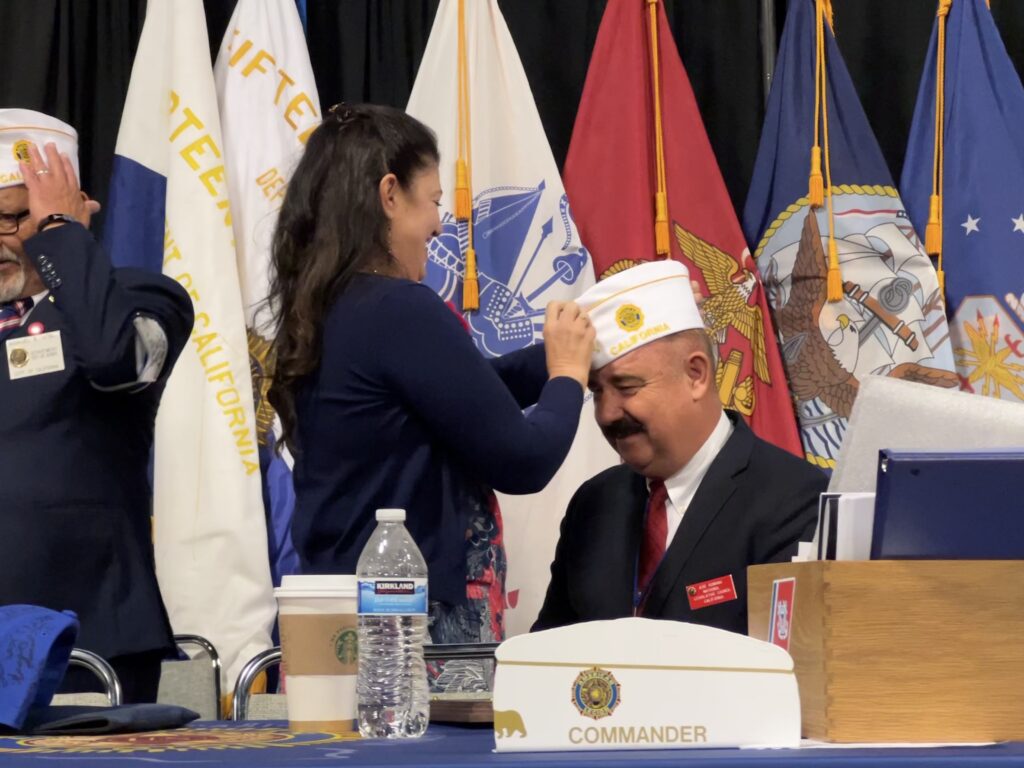
First Lady Martha Romano “caps” incoming Department Commander Jere Romano during the American Legion Department of California’s 103rd annual convention in Visalia, Calif., on Sunday, June 26, 2022. (Photo: Jared Morgan/California American Legion)
The American Legion’s Department of California closed it’s 103rd annual convention in Visalia, Calif., on Sunday, June 26, with the election of a new top leader and the passing of seven resolutions supporting major issues of interest to the veteran community. The resolutions will go before the delegation of The American Legion’s national convention for consideration in Milwaukee late-August.
The crowd in attendance at the Visalia Convention Center was jubilant as First Lady Martha Romano “capped” her husband Jere Romano during the leadership changeover Sunday afternoon.
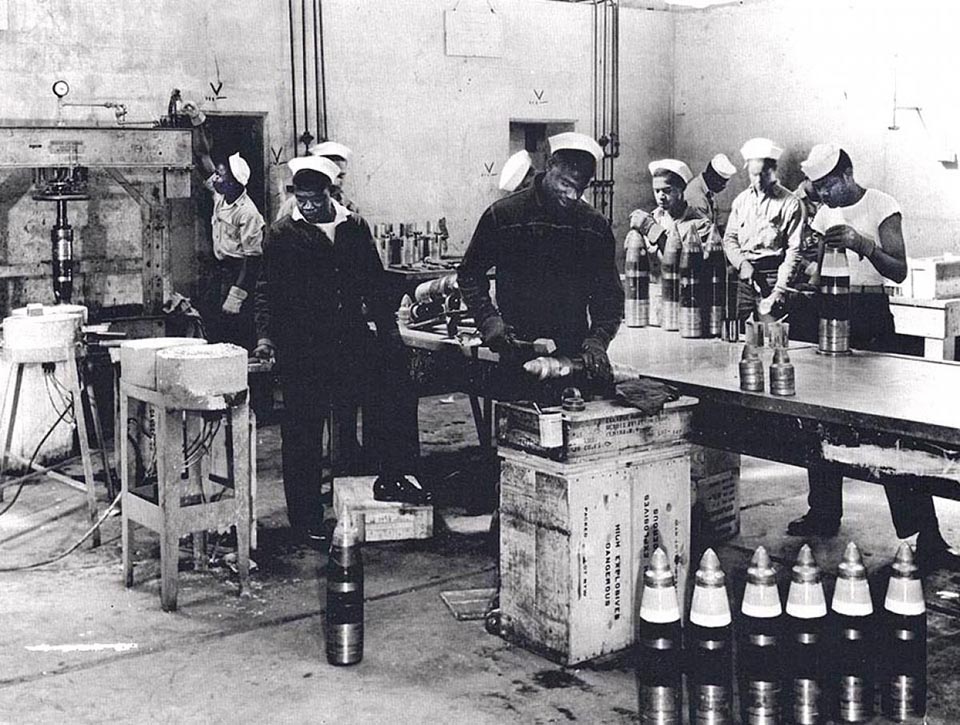
Correcting injustice against Black sailors
The delegation of several hundred veterans also voted to have the “Port Chicago Fifty” and the “Philadelphia Fifteen” exonerated for punishment received in the 1940s. Both groups were comprised of Black sailors who voiced concerns about how they were being treated by their commands.
The “Port Chicago Fifty” were court-martialed for protesting unsafe ammunition handling practices after the deaths of 320 servicemen and the “Philadelphia Fifteen” for writing a letter to a newspaper describing shipboard abuse and discrimination.
The resolution seeks to correct the actions of “institutional racism” rampant in that era and “urges Secretary of the Navy to sign a document to remove an injustice and by collaborating with Congress to exonerate these Sailors and upgrade their discharges to honorable.”
Correcting injustice against Filipino soldiers
From July 26, 1941, to Dec. 31, 1946, Filipino U.S. Army soldiers and guerrillas fought and defended a sovereign territory of the United States, as part of the U.S. Armed Forces in the Far East and defeated the Japanese Imperial Forces in October 1944 and liberated the Philippines in August 1945. The Rescission Act of 1946 provided that “service in the Commonwealth Army of the Philippines should not be deemed to have been service in the military or naval forces of the United States,” therefore, post-WWII benefits for Filipino veterans of the U.S. Army were no longer the responsibility of the U.S. government.
In 1998, U.S. Representative Nancy Pelosi stated, “I consider the Rescission Act of 1946 to be a scar on the historical record of the United States,” and this injustice to Filipino WWII veterans remains a dark chapter in U.S. history for as long as the 1946 Rescission Act remains in the books.
To help correct this injustice, The American Legion’s California delegation voted the national organization urge Congress to act and repeal the Rescission Act of 1946 to help heal the indignation and sorrow those veterans have endured.
Education and outreach to Filipino communities
With further regard to the destructive nature “The Rescission Act of 1946” had on the Filipino veteran community, the California delegation also voted to conduct outreach to over 250,000 WWII Filipino veterans throughout the respective communities of American Legion posts to “build back better and safer shelter.” This resolution also calls for the dissemination and implementation of education programs specifically designed for succeeding generations to remain motivated, vigilant and ready to do what is necessary to maintain and sustain the freedom that were preserved by the sacrifices of these warriors. Using the resources developed by FilVetREP; as well as the resources of an educational program for High School students as created by The Bataan Legacy Historical Society.
The Philippines Islands are considered by many to be the “Pearl Harbor” in Asia and the Filipino veterans of WWII were the front-liners whose experience included the Bataan Death March and played a significant role in preserving freedom in the world. Those Filipino veterans suffered the injustice of the “The Rescission Act of 1946” and retroactively had their compensation and benefits annulled, which would have been payable to Filipino troops for their service during WWII.
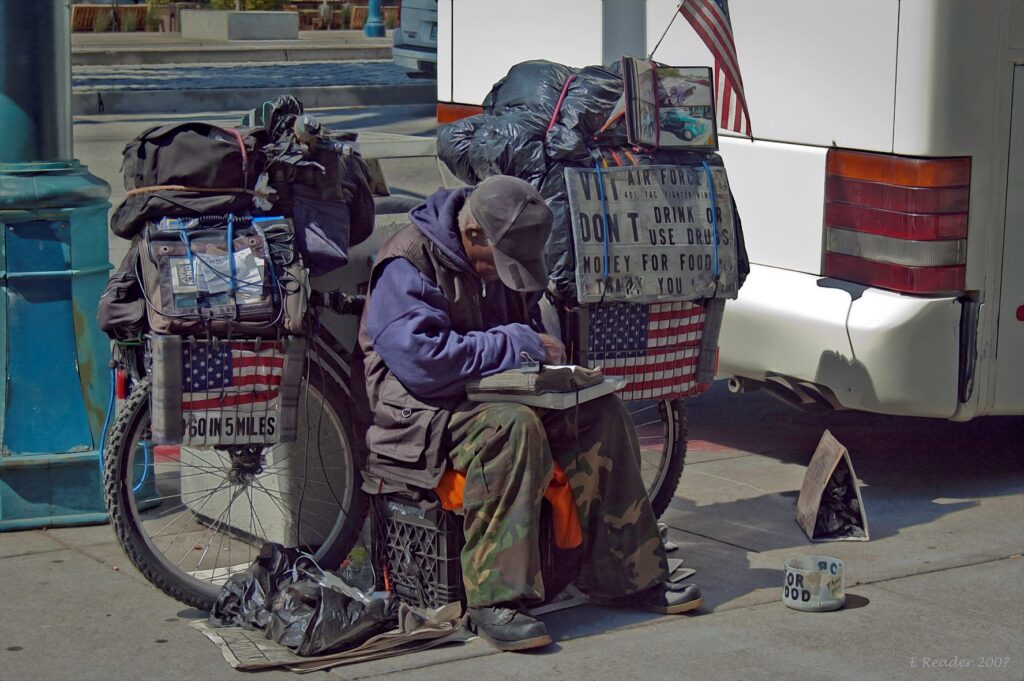
Homelessness has been a leading issue for California veterans for decades. (Photo: Evan Reader, Greatest Paka Photography)
More support for homeless veterans
Veterans represent approximately 11% of the general homeless population. Some 3.7% of veterans become homeless in the first five years after service. Isolation and lack of social support systems are major risk factors among United States veterans leading to one out of five veterans living alone with an increased risk of going homeless if proper social support is not in place after discharge. The (FY) 2021 Department of Veteran Affairs Community Homelessness Assessment, Local Education and Networking Groups (CHALENG) report that consistent with 2020 data and with the previous 20 years of data, unmet needs of veterans are primarily services that VA cannot provide directly.
Project CHALENG cites eight of the 10 unmet needs continue to be housing for veterans who need to register as sex offenders, and legal assistance in the areas of court fees/court fines, credit issues/debt collection, expunging criminal records, child support, family law, discharge upgrade appeals, and tax issues. It sites six of the 10 met needs continue to be medical services, mental health services, case management, food, TB testing, and substance abuse treatment.
Several studies have identified unemployment as one of the factors that greatly contribute to homelessness among veterans due to a combination of factors that may or may not include mental or physical problems and substance abuse.
The California delegation voted to renew its commitment to assisting homeless veterans and their families with continued support the efforts of the public and private sector agencies and organizations offer with resources necessary to aid homeless veterans and their families. This effort should seek and support any legislative or administrative proposal that will provide medical, rehabilitative and employment assistance to homeless veterans and their families. The delegation expressed strong support of the importance of collaboration among agencies and sectors to meet the needs of veterans and put an end to homelessness and at-risk homelessness among veterans.
Expand interments at Veterans Affairs national cemeteries
The California Delegation also voted to urge the federal government to amend Section 2402 of Title 38, United States Code, to expand interments at Veterans Affairs national cemeteries for 1.) members of the Reserve Components whose service was terminated under honorable conditions; 2.) members of the Reserve Officers’ Training Corps of the Army, Navy, or Air Force who died under honorable conditions while a member; and 3.) the spouse, minor child, or unmarried adult child of any member described above.
Tax policies that support veterans
The American Legion supports veteran-owned and service-disabled veteran-owned small business development, growth, entrepreneurship, and preference in government contracting. The federal government has the obligation to minimize tax burdens for veterans, active-duty military personnel, and their families. The American Legion has historically supported enhancements to the Work Opportunity Tax Credit program that would increase incentives for businesses to hire veterans, service-disabled veterans, and active-duty.
Tax relief is an important policy mechanism for ensuring a conducive economy that allows for veteran-owned small businesses and military families to achieve their financial goals. Tax reform provides a unique opportunity to provide financial support to military families and ensure that they have flexibility when filing their taxes. Fiscal policy encompasses a wide variety of issues that have the potential to impact the lives of veterans, active-duty service members, and their families. The American Legion broadly supports tax policies that benefit veterans, veteran small businesses, active-duty service members, and military families.
Veteran food insecurity
The delegation also supported a resolution pushing support of legislation that facilitates solutions that effectively addresses the unique circumstances that lead to food insecurity among veterans. The delegation further called on the national organization to extend support to legislation that secures the availability of food resources and systems that serve as a pipeline in getting nutrition to veterans who are experiencing or at risk of food insecurity.

